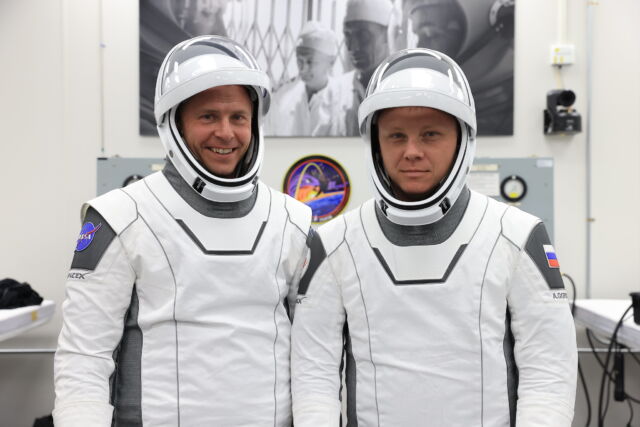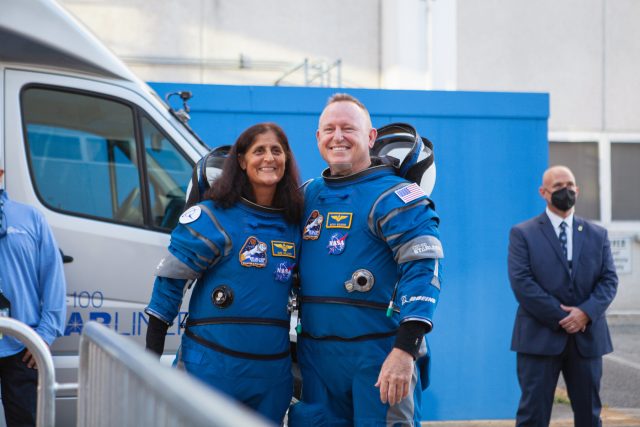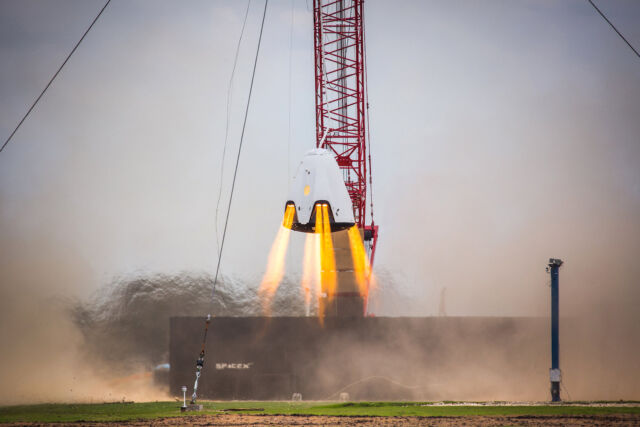NASA/Keegan Barber
NASA astronaut Nick Hague and Russian cosmonaut Aleksandr Gorbunov lifted off Saturday from Florida’s Area Coast aboard a SpaceX Dragon spacecraft, heading for a five-month expedition on the Worldwide Area Station.
The 2-man crew launched on prime of SpaceX’s Falcon 9 rocket at 1:17 pm EDT (17:17 UTC), benefiting from a break within the stormy climate to start their climb to area. 9 kerosene-fueled Merlin engines powered the primary stage of the flight on a trajectory northeast from Cape Canaveral Area Power Station, then the booster indifferent and returned to touchdown at Cape Canaveral because the Falcon 9’s higher stage accelerated SpaceX’s Crew Dragon Freedom spacecraft into orbit.
“It was a candy journey,” Hague stated after arriving in area. With a seemingly flawless launch, Hague and Gorbunov are on observe to reach on the area station round 5:30 pm EDT (2130 UTC) Sunday.
Empty seats
That is SpaceX’s fifteenth crew mission since 2020, and SpaceX’s tenth astronaut launch for NASA, however Saturday’s launch was uncommon in a few methods.
“All of our missions have distinctive challenges, and this one, I believe, can be memorable for lots of us,” stated Ken Bowersox, NASA’s affiliate administrator for area operations.
First, solely two folks rode into orbit on SpaceX’s Crew Dragon spacecraft, quite than the same old complement of 4 astronauts. This mission, generally known as Crew-9, initially included Hague, Gorbunov, commander Zena Cardman, and NASA astronaut Stephanie Wilson.
However the troubled check flight of Boeing’s Starliner spacecraft threw a wrench into NASA’s plans. The Starliner mission launched in June with NASA astronauts Butch Wilmore and Suni Williams. Boeing’s spacecraft reached the area station, however thruster failures and helium leaks plagued the mission, and NASA officers determined final month it was too dangerous to deliver the crew again to Earth on Starliner.
NASA chosen SpaceX and Boeing for multibillion-dollar industrial crew contracts in 2014, with every firm accountable for creating human-rated spaceships to ferry astronauts to and from the Worldwide Area Station. SpaceX flew astronauts for the primary time in 2020, and Boeing reached the identical milestone with the check flight that launched in June.
Finally, the Starliner spacecraft safely returned to Earth on September 6 with a profitable touchdown in New Mexico. But it surely left Wilmore and Williams behind on the area station with the lab’s long-term crew of seven astronauts and cosmonauts. The area station crew rigged two momentary seats with foam inside a SpaceX Dragon spacecraft at the moment docked on the outpost, the place the Starliner astronauts would journey residence in the event that they wanted to evacuate the complicated in an emergency.

NASA/Kim Shiflett
It is a momentary measure to permit the Dragon spacecraft to return to Earth with six folks as an alternative of the same old 4. NASA officers determined to take away two of the astronauts from the subsequent SpaceX crew mission to liberate regular seats for Wilmore and Williams to journey residence in February, when Crew-9 was already slated to finish its mission.
The choice to fly the Starliner spacecraft again to Earth with out its crew had a number of second-order results on area station operations. Managers at NASA’s Johnson Area Heart in Houston needed to determine who to bump from the Crew-9 mission and who to maintain on the crew.
Nick Hague and Aleksandr Gorbunov ended up holding their seats on the Crew-9 flight. Hague initially educated because the pilot on Crew-9, and NASA determined he would take Zena Cardman’s place as commander. Hague, a 49-year-old Area Power colonel, is a veteran of 1 long-duration mission on the Worldwide Area Station and in addition skilled a uncommon in-flight launch abort in 2018 as a consequence of a failure of a Russian Soyuz rocket.
NASA introduced the unique astronaut assignments for the Crew-9 mission in January. Cardman, a 36-year-old geobiologist, would have been the primary rookie astronaut with out check pilot expertise to command a NASA spaceflight. Three-time area shuttle flier Stephanie Wilson, 58, was the opposite astronaut faraway from the Crew-9 mission.
The choice on who to fly on Crew-9 was a “actually shut name,” stated Bowersox, who oversees NASA’s spaceflight operations directorate. “They have been considering very onerous about flying Zena, however on this scenario, it made sense to have someone who had a minimum of one flight beneath their belt.”
Gorbunov, a 34-year-old Russian aerospace engineer making his first flight to area, moved over to take the pilot’s seat within the Crew Dragon spacecraft, though he stays formally designated a mission specialist. His remaining presence on the crew was preordained due to a global settlement between NASA and Russia’s area company that gives seats for Russian cosmonauts on US crew missions and US astronauts on Russian Soyuz flights to the area station.
Bowersox stated NASA will reassign Cardman and Wilson to future flights.

Operational flexibility
This was additionally the primary launch of astronauts from Area Launch Advanced-40 (SLC-40) at Cape Canaveral, SpaceX’s busiest launch pad. SpaceX has outfitted the launch pad with the gear essential to assist launches of human spaceflight missions on the Crew Dragon spacecraft, together with a greater than 200-foot-tall tower and a crew entry arm to permit astronauts to board spaceships on prime of Falcon 9 rockets.
SLC-40 was beforehand based mostly on a “clear pad” structure, with none buildings to service or entry to Falcon 9 rockets whereas they have been vertical on the pad. SpaceX additionally put in slide chutes to offer astronauts and floor crews an emergency escape route away from the launch pad in an emergency.
SpaceX constructed the crew tower final 12 months and had it prepared for the launch of a Dragon cargo mission to the area station in March. Saturday’s launch demonstrated the pad’s means to assist SpaceX astronaut missions, which have beforehand all departed from Launch Advanced-39A (LC-39A) at NASA’s Kennedy Area Heart, just a few miles north of SLC-40.
Bringing human spaceflight launch functionality on-line at SLC-40 provides SpaceX and NASA further flexibility of their scheduling. For instance, LC-39A stays the one launch pad configured to assist flights of SpaceX’s Falcon Heavy rocket. SpaceX is now making ready LC-39A for a Falcon Heavy launch October 10 with NASA’s Europa Clipper mission, which solely has a window of some weeks to depart Earth this 12 months and attain its vacation spot at Jupiter in 2030.
With SLC-40 now licensed for astronaut launches, SpaceX and NASA groups are capable of assist the Crew-9 and Europa Clipper missions with out worrying about scheduling conflicts. The Florida spaceport now has three launch pads licensed for crew flights—two for SpaceX’s Dragon and one for Boeing’s Starliner—and NASA will add a fourth human-rated launch pad with the Artemis II mission to the Moon late subsequent 12 months.
“That’s fairly thrilling,” stated Pam Melroy, NASA’s deputy administrator. “I believe it’s a mirrored image of the place we’re in our area program at NASA, but additionally the capabilities that america has developed.”
Earlier this week, Hague and Gorbunov participated in a launch day costume rehearsal, once they had the chance to familiarize themselves with SLC-40. The launch pad has the identical capabilities as LC-39A, however with a barely completely different format. SpaceX additionally test-fired the Falcon 9 rocket Tuesday night, earlier than reducing the rocket horizontal and shifting it again right into a hangar for safekeeping because the outer bands of Hurricane Helene moved by way of Central Florida.
Contained in the hangar, SpaceX technicians found sooty exhaust from the Falcon 9’s engines gathered on the surface of the Dragon spacecraft through the test-firing. Floor groups wiped the soot off of the craft’s photo voltaic arrays and warmth protect, then repainted parts of the capsule’s radiators across the fringe of Dragon’s trunk part earlier than rolling the car again to the launch pad Friday.
“It is vital that the radiators radiate warmth within the correct method to area, so we needed to put some new paint on to get that again to the proper emissivity and the proper reflectivity and absorptivity of the photo voltaic radiation that hit these panels so it is going to reject the warmth correctly,” stated Invoice Gerstenmaier, SpaceX’s vice chairman of construct and flight reliability.
Gerstenmaier additionally outlined a brand new backup means for the Crew Dragon spacecraft to soundly splash down even when all of its parachutes fail to deploy on ultimate descent again to Earth. This includes utilizing the capsule’s eight highly effective SuperDraco thrusters, usually solely used within the unlikely occasion of a launch abort, to fireplace for just a few seconds and gradual Dragon’s pace for a secure splashdown.

SpaceX
“The best way it really works is, within the case the place all of the parachutes completely fail, this primarily fires the thrusters on the very finish,” Gerstenmaier stated. “That primarily provides the crew an opportunity to land safely, and primarily escape the car. So it isn’t utilized in any partial circumstances. We will land with one chute out. We will land with different failures within the chute system. However that is solely within the case the place all 4 parachutes simply don’t function.”
When SpaceX first designed the Crew Dragon spacecraft greater than a decade in the past, the corporate needed to make use of the SuperDraco thrusters to allow the capsule to carry out propulsive helicopter-like landings. Finally, SpaceX and NASA agreed to vary to a extra standard parachute-assisted splashdown.
The SuperDracos remained on the Crew Dragon spacecraft to push the capsule away from its Falcon 9 rocket throughout a catastrophic launch failure. The eight high-thrust engines burn hydrazine and nitrogen tetroxide propellants that combust when making contact with each other.
The backup choice has been activated for some earlier industrial Crew Dragon missions, however not for a NASA flight, in line with Gerstenmaier. The aptitude “offers a tolerable touchdown for the crew,” he added. “So it is a true deep, deep contingency. I believe our philosophy is, quite than have a system that you do not use, though it isn’t perhaps totally licensed, it provides the crew an opportunity to flee a extremely, actually dangerous scenario.”
Steve Stich, NASA’s industrial crew program supervisor, stated the emergency propulsive touchdown functionality can be enabled for the return of the Crew-8 mission, which has been on the area station since March. With the arrival of Hague and Gorbunov on Crew-9—and the extension of Wilmore and Williams’ mission—the Crew-8 mission is slated to depart the area station and splash down in early October.
This story was up to date after affirmation of a profitable launch.

